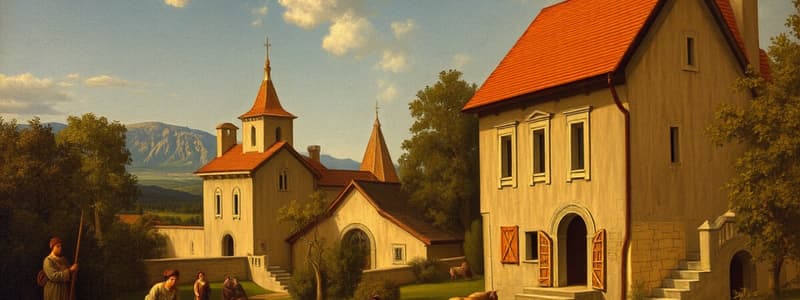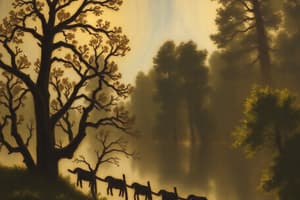Podcast
Questions and Answers
What was the primary catalyst for the cultural revival during the Renaissance?
What was the primary catalyst for the cultural revival during the Renaissance?
- The conquests of the Ottoman Empire
- The recovery from the effects of the Black Death (correct)
- The establishment of the printing press
- The expansion of the Catholic Church's influence
How did the Renaissance redefine the concept of human potential?
How did the Renaissance redefine the concept of human potential?
- It reinforced the idea of divine intervention in human affairs
- It fostered a high regard for individual ability and personal achievement (correct)
- It introduced a belief in predetermined social status
- It emphasized collective achievement over individual success
In what way did the achievements of the Italian Renaissance primarily manifest?
In what way did the achievements of the Italian Renaissance primarily manifest?
- As a result of collaboration between different social strata
- In the artistic and intellectual accomplishments of the wealthy upper classes (correct)
- By universalizing Classical antiquity's philosophies among the masses
- Through widespread popular movements across all social classes
What term describes the ideal individual characterized by diverse achievements during the Renaissance?
What term describes the ideal individual characterized by diverse achievements during the Renaissance?
Which of the following best describes the relationship between the Renaissance and the Middle Ages?
Which of the following best describes the relationship between the Renaissance and the Middle Ages?
Flashcards are hidden until you start studying
Study Notes
Transition from Middle Ages to Renaissance
- The period following the Roman Empire was labeled the "Middle Ages," perceived as a time of darkness due to a decline in Classical culture.
- Nineteenth-century historians, including Jacob Burckhardt, noted this lack of culture in Italy and introduced the modern concept of the Renaissance.
Jacob Burckhardt's Contribution
- Burckhardt's work, The Civilization of the Renaissance in Italy (1860), characterized Italy in the 14th and 15th centuries as the birthplace of the modern world.
- He identified key features of the Renaissance: revival of antiquity, focus on individualism, and secularism.
- Burckhardt's emphasis on individuality and secularism, while exaggerated, established a framework for interpreting the Renaissance.
Renaissance Characteristics and Continuity
- Contemporary scholars recognize the Renaissance as a distinct period but note continuity with the Middle Ages in economic, political, and social aspects.
- Italy, particularly northern regions, was primarily urbanized with independent city-states becoming cultural hubs.
Effects of Urban Society
- The rise of wealthy city-states facilitated a secular spirit, allowing for enjoyment of worldly pleasures and recovery from the traumas of the fourteenth century.
- The Renaissance marked a revival of interest in Classical antiquity, influenced by earlier preservation of Latin culture from the Middle Ages.
Intellectual and Cultural Developments
- Increased awareness of historical roots led to fascination with Greco-Roman culture and attempts to reconcile pagan philosophies with Christian thought.
- A significant focus on individual ability emerged, encapsulated in the idea that “Men can do all things if they will,” according to architect Leon Battista Alberti.
Emergence of the Universal Person
- The Renaissance ideal was embodied in the concept of l’uomo universale, or the universal person, who excelled in various fields.
- This ideal reflected a new social norm valuing human dignity, individual potential, and the well-rounded personality.
Socioeconomic Implications
- Achievements of the Renaissance primarily stemmed from the wealthy upper classes, forming an elite cultural movement rather than a widespread mass influence.
- Despite being an elite endeavor, Renaissance culture indirectly influenced ordinary people, particularly in urban settings where artistic and intellectual outputs were evident.
Studying That Suits You
Use AI to generate personalized quizzes and flashcards to suit your learning preferences.




